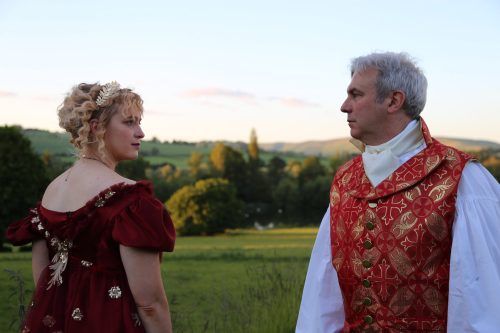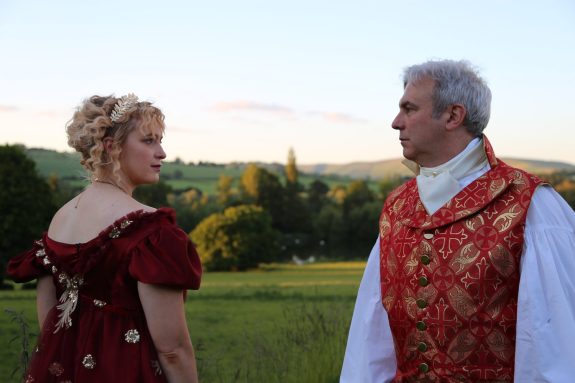 United Kingdom Mozart, Don Giovanni: Soloists, Chorus and Orchestra of Regents Opera / Ben Woodward (musical director). Hoxton Hall, London, 29.6.2024. (JH-E)
United Kingdom Mozart, Don Giovanni: Soloists, Chorus and Orchestra of Regents Opera / Ben Woodward (musical director). Hoxton Hall, London, 29.6.2024. (JH-E)

Production:
Director — Sarah Heenan
Assistant Director/Stage manager — Eleanor Strutt
Costume designer — Alexia Tonkin
Lighting — Joe Doody
Producer — Oliver Gibbs
Cast:
Don Giovanni — Oliver Gibbs
Leporello — Ashley Mercer
Donna Anna — Christine Buras
Donna Elvira — Isolde Roxby
Zerlina — Justine Viani
Don Ottavio — Davide Basso
Masetto — Alistair Ollerenshaw
The Commendatore — Andrew Tinkler
A Regency-styled Don Giovanni sounds as though it might be a trite swing on the recent Bridgerton-driven period fervour. But instead, Regents Opera’s production, directed by Sarah Heenan, presents a pleasingly minimal version that highlights the personal stakes and relationships of the characters, fed by a lively and personable cast.
Touring opera is always logistically difficult, but this show makes the most of what it can do. Much of the weight of set dressing falls on some lovely costuming in classic Regency silhouettes, with no backdrop and some ingenious use of larger props to create furniture, balconies, and even the climactic dinner. The minimalist approach redirects attention onto the characters and the drama, rather than wasting it on unnecessary details.
Unfortunately, the music sometimes suffered from the necessities of small-scale touring spaces. The reduced orchestration for flute, clarinet, cello, and keyboard (played by musical director Ben Woodward) was at times untidy and struggled to fill out Mozart’s orchestral passages. As an accompaniment to the singers, however, the ensemble worked well.
And indeed, the greatest benefits of the production and setting choice do come to the characters and their realism. The Regency always has appeal to British audiences as a period drama setting, and the social dynamics and difficulties have become familiar to us. By setting the opera in 1817 — the year of its London premiere — and in what director Sarah Heenan calls ‘an English Regency idea of Spain’, the audience is put in a comfortable world with known social stakes. The plights of Donna Anna and Donna Elvira become all the more engaging, and Don Giovanni’s transgressions more shocking with this context, and it really allows the characters to shine.
The women are especially vivid in this version, imbuing their characters with emotion and pathos. The small space of Hoxton Hall presented some musical difficulties — operatic voices that stand out in large houses can struggle not to sound somewhat harsh in small ones. Soprano voices particularly tend to fare worse with this, through no fault of their own. Isolde Roxby as Donna Elvira presented a powerful portrait of a woman struggling between love and rage, and the social consequences that might befall her, but her striking voice was not served by acoustics of the small space, sometimes coming across as brassy and a little harsh. Donna Anna, sung by Christine Buras, suffered less from this effect, but it still occasionally showed. She thrived in Donna Anna’s journey from a confused girl, first shown in the overture reluctantly accepting a proposal from Don Ottavio (Davide Basso) out of a lack of options, to a woman who uses her grief and anger to shape her own future.
Don Giovanni as a Regency rake didn’t come across as quite charming enough, but Oliver Gibbs was convincingly devil-may-care and selfishly unconcerned with the consequences of his actions. He worked marvellously with Ashley Mercer’s put-upon Leporello, the two of them playing off each other for some of the show’s most entertaining moments. Mercer sparkled in Leporello’s fast patter and brought an awareness of the distinctions of class that always lie in Mozart’s operas to the fore. Justine Viani as Zerlina had some difficult moments with intonation, but made for a pleasingly coquettish Zerlina, especially with Alistair Ollerenshaw as Masetto.
The turn towards a Frankenstein-inspired ending has more mixed success than the rest of the production. Donna Anna becomes a version of Mary Shelley herself combined with her Doctor Frankenstein, and with the help of Leporello and Donna Elvira, re-animates her father in order to terrify Don Giovanni. The use of this twist in the plot, in allowing the women and servants of the story the ultimate agency in its direction, is satisfying and does much to strengthen the characters of Donna Anna and Donna Elvira. The sharply contoured Frankenstein makeup given to Andrew Tinkler’s Commendatore is less effective and lends the dinner scene a ludicrous element which fits less well with the intense interpersonal dynamics that are otherwise the focus. But incorporating the supernatural is always a challenge for any production of Don Giovanni, particularly one that otherwise aims for some level of social realism, and the final death coming by Giovanni being first stabbed, then shot, works particularly well.
Overall, this is a production that is driven forward by the strong chemistry of what ends up feeling very much like an ensemble cast, and a production that allows this to shine. While the musical excellence doesn’t always dazzle, this nonetheless makes for an entertaining and watchable performance, with much to enjoy.
Julien Harman-Evans
For more about Regents Opera click here.
